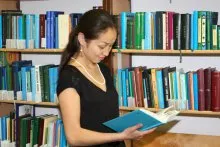

She decided to consult her uncle, a master of Altai throat singing who created a contemporary biblical epic called “Eshua” that relates the biblical story from Genesis to Revelation in the kai style of Altai poetry. Her uncle gathered the whole local church together in order to choose an appropriate name for the newly created Altai website, and the name that they finally suggested was one dear to the Altai ear: “Sudur Bichik”, or “The prophetic book.” For his niece, hearing this name instantly brought her back to the depths of her childhood. It was as if an old legend heard from her mother and later forgotten had re-entered her consciousness.

For this young lady the secrets of the lost Altai prophetic book have already started to reveal themselves through the study of the Book of books, especially through the prophetic parts of the Bible. “I’m very much interested in the book of Daniel,” she says. “In the first beast from the vision of Daniel (Dan 7:4), if you read carefully, you can recognize... the emblem of the Republic of Altai! Our emblem depicts a griffin. It is a symbol of the ancient Pazyryk culture, which coincides with the time of the Babylonian empire. For me the appeal of Daniel to Nebuchadnezzar was like a revelation: “Your Majesty, you are the king of kings. The God of heaven has given you dominion and power and might and glory; in your hands he has placed all mankind... Wherever they live, he has made you ruler over them all” (Dan 2:37-38). It’s possible that the people of that time were speaking in accordance with their limited knowledge of geography, but we can also interpret these words in another way, that there was indeed one “head of gold” – that single Babylonian Empire that had spread to the most distant corners of the earth, including Altai. And the remains of the Pazyryk culture on the plateaus of Altai indicate how much the Altai was connected with Persia and India.”

On the new website one will soon find a video with the performance of the epic “Eshua” accompanied by pictures of Altai’s pristine nature. The site already houses the New Testament in the new Altai translation together with its audio recording and a parallel Russian text. This is available in a variety of formats, including those suitable for mobile devices. The site solicits active feedback and participation from visitors: one may study the Bible online, or upload one’s own poetry, music, or life testimony in the Altai language. Studying the biblical text is the true fulfillment of Altai spiritual aspirations found in their belief in the ancient prophetic book “Sudur Bichik”. But this is something that people can only do together. The “Sudur Bichik” website thus welcomes both Altai tradition and a living stream of ideas. Age-old hopes and urgent questions of today take shape and find their specific answers in the pages of the Book of books – the lost prophetic book, which has been found anew.
IBT Russia/CIS is a non-profit organization financed through contributions from individuals, sponsoring organizations and foundations.
You can donate to IBT:
Through: AO UniCredit Bank, Moscow
SWIFT: IMBKRUMM
In favour of: Institute for Bible Translation
Address: 119334, Russia, Moscow, Andreevskaya nab. 2
TIN (INN) 7736231521
9-digit Bank identification code in Russian banking system: 044525545
Account no. (IBAN):
634261 USD 4020 02 001 or 40703840700010142881
634261 EUR 4020 02 001 or 40703978700010366720
634261 GBP 4020 02 001 or 40703826600010366723
Through: NOSTRO ACCOUNTS OF AO UNICREDIT BANK, MOSCOW:
USD JPMORGAN CHASE BANK N.A., NEW YORK SWIFT CODE: CHASUS33
EUR UNICREDIT BANK AG (HYPOVEREINSBANK) , MUNICH SWIFT CODE: HYVEDEMM
EUR UNICREDIT BANK AUSTRIA AG, VIENNA SWIFT CODE: BKAUATWW
EUR UNICREDIT S.P.A., MILANO SWIFT CODE: UNCRITMM
GBP THE ROYAL BANK OF SCOTLAND PLC, LONDON SWIFT CODE: RBOSGB2L
Important! In the field "designation" write "CHARITY DONATION"
For more information address IBT
You may sign up to receive our Russia/CIS monthly English newsletter here
